How often do you think customers discuss your products and their problems or drawbacks? How well do you know your brand online context?
Nowadays most businesses are already aware of the importance of listening to social media conversations mentioning their brand name as well as regularly searching their name in Google.
But in most cases, they’re not doing nearly enough.
You need to be monitoring what other words people tend to type next to your brand name, as well as the brand names of your competitors. Researching and monitoring online context of your brand name helps you to:
- Understand which parts of your site are unclear to your customers (and decide how you can better serve the users)
- Plan your company’s content strategy to better explain your site features, as well as “own” search results pages for brand-focused keywords
- Identify weak points of your product or service and spot the clear trend (e.g. a particular product line causing more complaints than others)
- See where your competitors are lacking (and how you can fit into the market better)
Tools for brand-focused keyword research
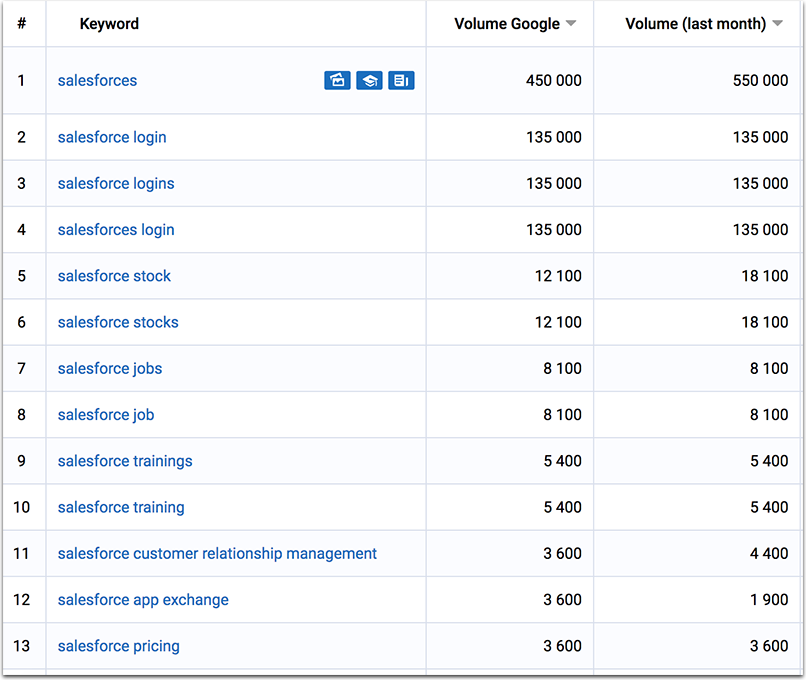


Your favorite keyword research tool will probably be enough for this purpose. Simply use your or your competitor’s brand name and see what it comes up with.
My preferred keyword research tool is Serpstat:
I also love the tag cloud they generate for their keyword suggestions: These are most popular words that tend to be used next to the brand name when people search for it in Google, in other words, this is your brand name online context right out there:
This tag cloud gives a cool snapshot of the whole list giving you an idea of what people are trying to solve in Google involving your or your competitor’s brand name.
Another tool I often use is SEOchat’s Bulk Google Suggest tool, which generates auto-suggest results from Google, YouTube, and Amazon.
This way you can see keyword suggestions with different types of intent:
- YouTube Auto-Suggest: Users tend to search for more informational and entertaining results here
- Amazon Auto-Suggest: Most people use Amazon when they intend to buy something
- Google Auto-Suggest: All types of search results can be found here
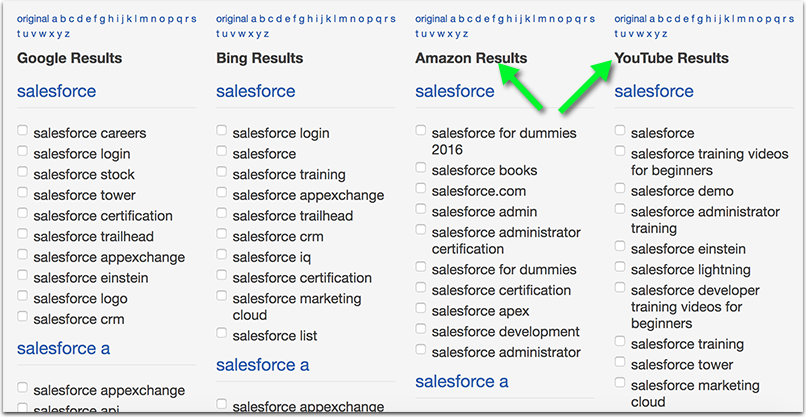
Learn how to combine SEO and PPC to increase your traffic in our free ebook!
How monitoring branded keywords helps build your online marketing strategy
Once you’ve generated the list of keyword phrases containing your brand name, you’ll want to sort them out. For example, you can create an Excel file and label each keyword based on which further action you want to take, for example:
- Create new content to target this keyword
- Create a new section on the site targeting this keyword or the group of keywords
- Make a section of your site or a web page more visible (Something that would help users to find it easily)
- Launch a new feature/product/service that would cover a need your competitor isn’t covering
Here are two major marketing tasks brand-focused keyword research can help you with:
1. Plan on-site content (e.g. generate a FAQ section)

Are people asking Google about you and your brand? You should be ranking #1 for all of those queries. Let the keyword research direct your on-site content marketing plan.
It’s pretty easy to rank for those terms too, provided you have a page addressing each query: Google is very good at understanding entities (brands) and ranking official websites when responding to navigational queries. All you need is to create a separate page, each addressing a separate set of keywords:
- How to login/signing to [BRAND NAME]
- [BRAND NAME] reviews: What our users are saying
- [BRAND NAME] pricing
- [BRAND NAME] alternatives
There should be separate pages, rich in content, video tutorials, and screenshots, addressing these search queries for them to rank well
If you’re managing a bigger brand, you should also keep an eye on special Google search features which may appear when people are searching for those terms:
- “Quick-answer boxes“
- People also ask…
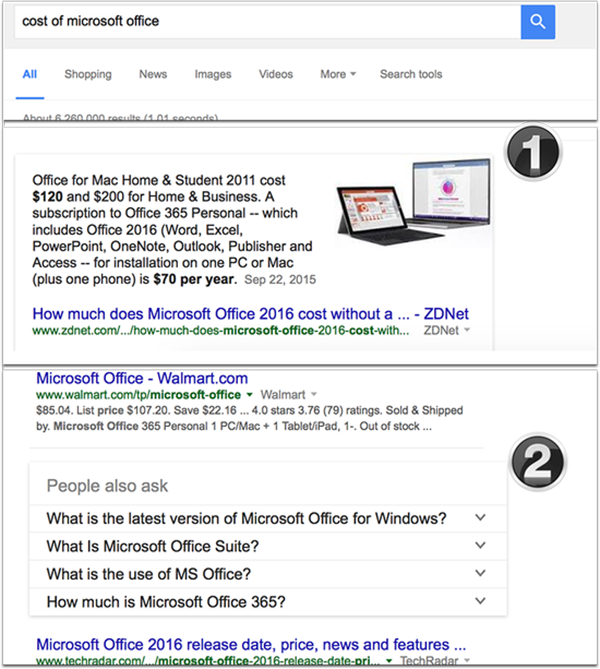
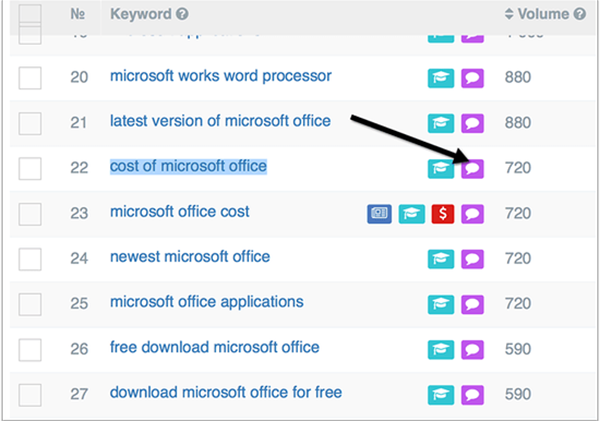
Serpstat can help you research those, too. Look out for icons that stand for different types of specific search features:
You should be aiming at ranking in those featured sections too, or at least keep a close eye on them to make sure they’re providing correct answers to those questions.
2. Identify your product (or your competitors’) weak spots
Another important goal of brand-focused keyword research is understanding your product’s or service’s weak points. There are all kinds of keyword modifiers that might signal a possible reputation management crisis, negative reputation campaigns against your business, or at least a poorly-explained feature.
Look for phrases containing the following and similar words:
- Security
- Scam
- Spam
- Returns
- Alternatives
- Refund
If these words appear in Google Suggest or keyword research results, that means enough people are searching for them. It signals major problems and should be addressed on a higher level.
Moreover, the following words can suggest frequent tech problems, which may prevent your customers from using your site:
- Down
- Slow
- Malware
- Downtime
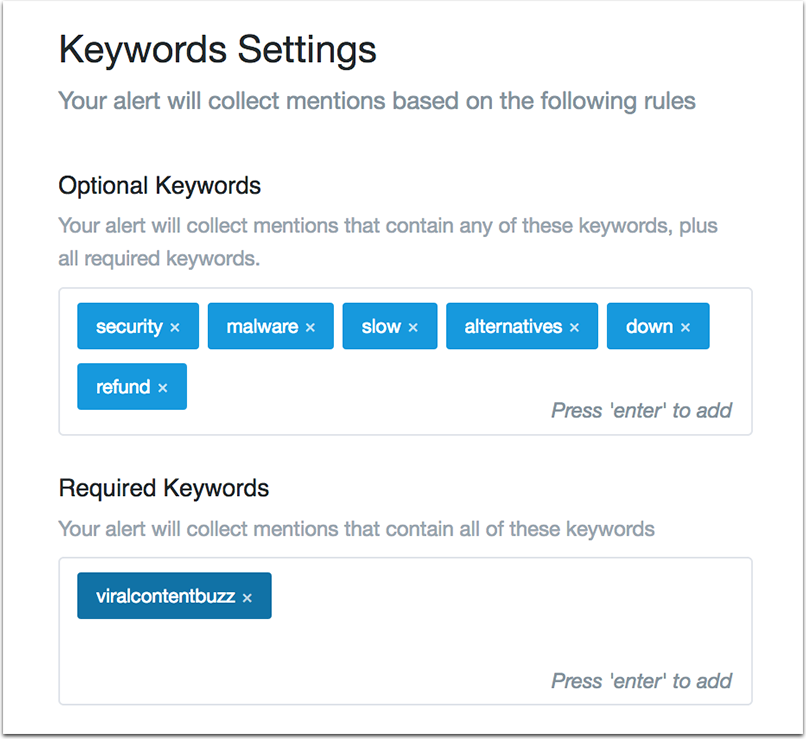
To prevent a social media crisis or spot a bad user experience, use the above words to set up social media monitoring.
You need to be the first to hear anyone use them in conjunction with your brand name to quickly engage, explain, apologize or take other necessary action. Mention can help you with that.
Alternatively, you can use Mention’s “Boolean search” feature, which allows up to 20,000 characters per query, so you can fit all of these words in one alert.
On another hand, if you spot these during the competitor research, you have a good opportunity for competitive advantage.
Scale and delegate
It’s a lot of monitoring and managing involved, especially if you include competitor monitoring (which you should, because it’ll open your eyes for sure!). It’s important to find ways to scale the process.
Delegating tasks to the rest of the team is a part of being a marketer. You have to give up some control to better spread out tasks and get a more balanced result in your social pages.
Start scheduling blocks of time for other people so they can take part in playing with different search options and monitoring. It will make you so much more effective, and free you up for more profitable ventures that benefit the brand you are promoting.
You may even want to consider hiring someone to help you own this process. Keeping an eye on brand mentions and, moreover, its context, is crucial for your business success and stability.
Do you invest time and effort into brand-focused keyword research? Please share your tips in the comments!






